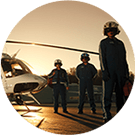Most pregnancies are uneventful, and women can continue with their daily lives with few restrictions. Flying, however, might not be an activity that is right for all pregnant women. Certain complications during pregnancy, in addition to the possibility of going into labor at 30,000 feet, might make flying riskier for some. Here, we provide a few tips for flying while pregnant to make your journey safer and more comfortable.
Flying While Pregnant – Comfort Measures
Being pregnant in the second and third trimesters can be uncomfortable. Flying can compound discomfort for a variety of reasons from dehydration to swelling. Pregnant fliers can take a few things in the cabin to help maintain their comfort while flying.
- Lumbar pillows: The curvature of the lower back changes during pregnancy. Give your lumbar some support with a strategically placed pillow in the small of your back.
- Maintain Hydration: Air cabins are notoriously dry. Keep a bottle of water nearby to stay hydrated in flight
- Compression stockings: Feet and lower legs swell during a flight and even more so during pregnancy. Use compression stockings to keep fluid from pooling in the lower leg.
- Layered Clothing: Body temperature can fluctuate while pregnant. Be sure to dress in easy-to-remove layers to not get overheated.
Flying While Pregnant- Safety
Being pregnant means having a suppressed immune system, an increased risk of blood clots, balance issues and even looser joints. Stay safe while flying with these tips:
- Keep it light: Heavy lifting is not recommended while pregnant. Keep bags light and ask for assistance with overhead bins.
- Use hand sanitizer: Pregnant women have a slightly suppressed immune system. Keep hand sanitizer at the ready and consider wearing a mask to avoid illness.
- Avoid blood clots: The compression stocking’s benefits are twofold. They reduce swelling and they can reduce blood clots. Also try to stand periodically during the flight.
- Go slowly: Try not to rush through airports and watch your step when boarding and deboarding the plane. Pregnant women can experience balance issues as their centers of gravity change.
Flying while Pregnant- Special Considerations
If you have had complications during your pregnancy, flying may not be appropriate for you. Pre-term labor, a history of blood clots in the leg (DVT), asthma, heart disease, high blood pressure or flying later in pregnancy may make flying risky. It’s best to discuss your pregnancy and travel plans with your obstetrician. Some airlines may also restrict flying in the third trimester- so check with the airline if you will be flying close to your due date.
Wherever you are traveling, AirMedCare Network’s Fly-U-Home membership means that, if there is a complication while traveling, you can get home. Our specially equipped aircraft and medical transport personnel ensure you can return to the hospital and doctor of your choice should a medical complication interrupt your travel. Membership means you pay nothing out of pocket for this important peace-of-mind and coverage extends to every member of your household. Learn more about this affordable membership.
Frequently Asked Questions:
When a program provides bedside-to-bedside service, the transport medical team accepts the patient at the bedside in the originating facility and delivers the patient to the bed of the receiving facility.
Yes, although it’s not always possible. It will solely depend on available space on our aircraft. All aircraft have the ability to accommodate a passenger, however, this space could be lost due to additional medical staff or medical equipment.
Anyone that resides in the household.

Air Ambulances are Helping Bridge the Gap in Healthcare for Rural Hospitals
One of the biggest issues in rural healthcare is the lack of healthcare facilities. Many rural areas don’t have enough doctors or hospitals, and appropriate

Tips for Flying while Pregnant
Most pregnancies are uneventful, and women can continue with their daily lives with few restrictions. Flying, however, might not be an activity that is right

Prepare for Travel with Expert Pre-travel Health Tips
Pre-travel health care is important for both domestic and international trips. It helps ensure you are ready to handle any common health problems that might




